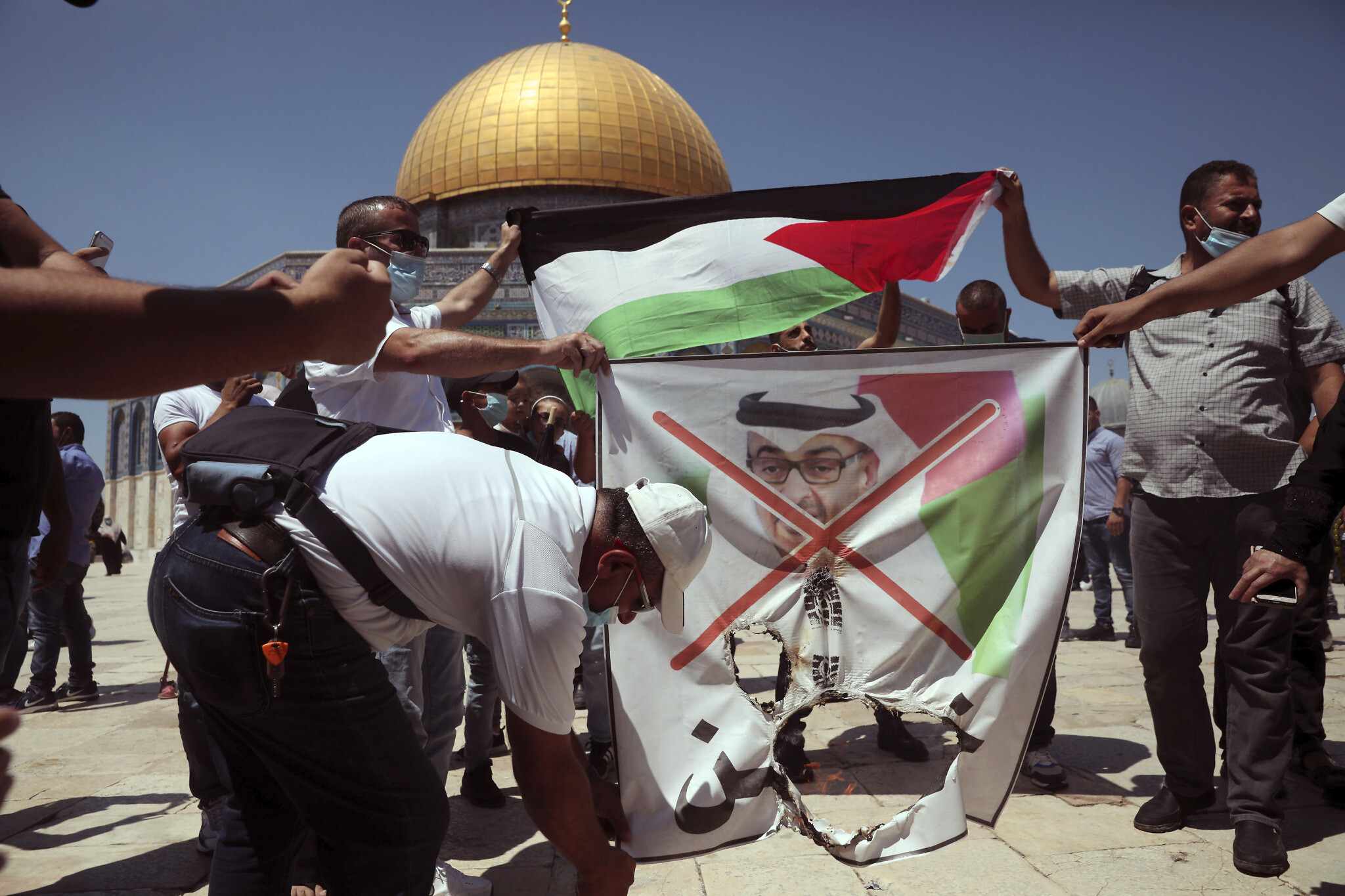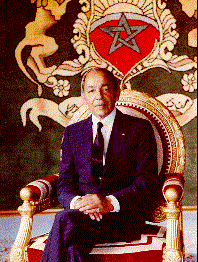The reaction toward Palestine is exacerbating Arab divisions that long existed between. And there is a root should be taken to account
When the conflict in Gaza broke out, it appeared that most Arab countries would state solidarity with Palestinian people, in line with the majority of the Muslim world. Yes, it is. The Arab states have to love, defend and respect Palestine, no?
Well, if you're not a Palestinian, nor even an Arab who have insight about the Arab states, then it will be a problem. Actually, the reaction between Arab nations do not show any sight about unity - it is rather, a conflicted, if not saying deeply sectarian situation among the Arab states.
But why Arab countries are unable to find a common solution? And how does it affect its status?
 |
| Palestinians burning portrait of UAE leader Mohammed bin Zayed Al Nahyan in 2018. |
Unfortunately, relations between the Palestinians and other Arab nations are not so wealthy.
There is a deep disgust and resentment against the other Arab entities from the Palestinians, a tribute to the infamous Arab-Israeli War of 1947. Before Israel became a nation like today, the Arabs were superior in number, more militarised and after the partition of Palestine, then under British administration, by the newly-established United Nations, tensions arose, the Arab armies from seven nations invaded Israel. The only thing Israel had was its men and materials left behind by Britain.
But Israeli fighters were battle-hardened, trained at World War II to fight a far worse enemy. The Arab armies, though superior, had incompetent commanders and soldiers not ready for war. Only the Arab Legion from Transjordan, the predecessor of the Kingdom of Jordan, proved to be the biggest adversary, the rest was poorly prepared and lost with casualties five times than that of Israel. In turn, it enabled the Al-Nakba or Palestinian exodus.
The aftermath of the war saw the Palestinians live as refugees in many places of the Arab countries, which, by pressure from the Saudis, were able to stay and refused to assimilate, a situation continues even today. Initially, the Arabs rallied behind the Palestinians and humiliated Israel in the 1956 war, diplomatically and politically, hence the early confidence. But when it repeated 11 years later, the Arabs got an ass-kicked by Israel disastrously. The loss to Israel in 1967 was total damage to Arab pride.
Arab nations salvaged some honours in the 1973 war, where it inflicted heavy casualties on Israel, though war crimes and atrocities against Israeli soldiers became a shock for many. Yet it failed to finally address the problem between Israel and Palestine, and so the relationship between Palestinians and the remaining Arab countries started to fray.
Palestinians began to question other Arab nations' commitment to its cause, turned to the first country that they blamed to have made Palestinians lost their home: Jordan.
Jordan was always complicated toward Palestine. Its rulers were drawn from the Hashemite family, a family traced origin from Hejaz in modern Saudi Arabia, thus alien to the Levantine natives in Jordan despite its blood link with Prophet Muhammad. They only came here because of British involvement in World War I, which one member of the family, Sharif Abdullah, future Abdullah I, left for this desolated and resourceless Transjordan, drawn by Winston Churchill in a clumsy effort. Yet, the Hashemites also made an agreement with the Zionist movement led by Chaim Weizmann in 1919, in which they would divide Palestine and Transjordan, giving Palestine to the Jews. Though it would be a failure, the agreement went on to shape the entire Near East for most of 20th century.
 |
| Faisal-Weizmann Agreement of 1919. |
The agreement was later used to stir up anti-Jordanian sentiment among the Palestinians because of how disclosed it was. Jordanian rulers showed no sympathy to Palestinians either. In 1947, it fought not for Palestinian liberation, but to depose Mohammed Amin Al-Hussaini, the Nazi mufti of WWII yet popular among Palestinian nationalists and radical Islamists, and to annex West Bank. When King Abdullah I came to pray at Al-Aqsa on 20 September 1951, he was shot dead by a Palestinian nationalist who accused Jordan of betraying Palestinians. Talal would assume the throne, but short-lived before abdicated a year later for his son Hussein, a playboy, to reign over, and Jordan oriented to American orbit, unofficially making Jordan in line with Israel. The Palestinians didn't forgive the Hashemites so easily even when Palestinians were granted equal citizenship rights like Jordanians.
This was best tasted when in spite of Jordan harbouring many Palestinian nationalist factions fighting against Israel, some even used Jordanian territory to strike on the Jewish entity, the Palestinian fedayeens (a term used to coin on self-defense group) frequently disrespected Jordanian laws. In a report in early 1970, the Palestinian fedayeens wanted to turn Jordan into the Arab Vietnam and Amman as the Hanoi of Arabia.
They finally did it in September 1970, instigated with the hijacking of four airliners between New York and London, forcing them to land in Dawson's Field in Zarqa. The hijackers then released all the hostages, with only one hijacker killed, he was not even Palestinian, but a Nicaraguan leftist named Patricio Argüello; of course, by blowing all of these planes as a warning to support for Israel among the various Western force. It happened three years after the humiliation of 1967.
 |
| The blow-up of airliners in Zarqa, September 1970. |
"Enough is enough!" The tough words from Hussein sparked a military conflict in which the Jordanians, with the help of Pakistani General Zia ul-Haq, routed the fedayeens and killed more than 4,000 fighters. The Jordanians lost nearly 1,000, but it prevented another Vietnam scenario in this country. As retribution, Jordan opened the border so the fedayeens could leave for Lebanon. The lesson Jordan took from building tie with the Palestinians was relevant - don't even bring Palestinians in. This was something King Ibn Saud alarmed after the 1947-48 war. Eventually, these fedayeens would go on establish the Palestine Liberation Organisation (PLO).
Countries that have Palestinians in soon faced another problem: Lebanon. The country was divided into a sectarian system dividing power between Christians, Sunnis and Shiites. The instability would rupture Lebanon and a civil war broke out. Once again, the Palestinians were in controversy. They joined forces with the militants of Lebanon that belonged to the Shiite/Sunni bases fighting against the Christian militias. Later on, they became played between by Syrian dictator Hafez al-Assad for pursuit in Lebanon.
The Palestinians also gained infamy not just only in Jordan and Lebanon. The Palestinians also directly involved in supporting Saddam Hussein's Iraq to fight Iran, before later attacked Kuwait in 1990. Since Kuwait is Saudi Arabia's ally, it sparked a bloody pan-Arab conflict, which Iraq lost after Saudi Arabia, alongside its Gulf allies and the United States, bombed Iraqi troops. The Palestinians were seen as complicit alongside Saddam, thus expelled from the country when the Kuwaiti leadership reaffirmed power in March 1991. The memoir of Palestinian support for Saddam would go deep in the memories of many Gulf Arab states, especially its rulers, reiterated by the former Saudi ambassador to the United States, Bandar bin Sultan Al Saud, on 2020 interview in Al Arabiya.
But there is another reason for the cold reaction to Palestinian conflict today among the Arabs - the Palestinians were willing to sell out everything to become a pawn on the wrong side, or unable to get the side they needed. During the Syrian Civil War, the Palestinians take sides of both rebels and the Assad government; hence became scapegoats in both groups' foul play of solidarity with Palestinians - widespread destruction of Palestinian refugee camps and rape against Palestinian women rose multiply. Currently, its alliance with Turkey and Iran have made Palestinians less trusted by the rest of Arab world, since many countries began viewing Turkey and Iran as equal threats. Even then, Turkey and Iran have their personal ambitions with Palestinians, not necessarily viewing them ally for good. In the past, it sided with Russia, but now Russia has abandoned Palestine in order to get warm with Israel - Israeli lobbies played an instrumental to help Trump, a pro-Russian candidate, becoming the 45th President of America, as well as active in calling for the United States and NATO to freeze support for Ukraine over perceived Kyiv's alliance with Ankara.
Yet even when some cases might not involve the Palestinians to blame for, Palestine is still a powerful influence that reckoned the Arab nations and instigated a lot of noises and troubles - a force dividing Arab countries instead of unifying. Think about Morocco and Algeria, for example.
Relations between Morocco and Algeria have always been uneasy because of historical mistrust. Think Morocco is a century-old kingdom where it has been ruled by various monarchs, the recent one being the Alaouites who came to Morocco from Arabia in 13th century and consolidated power four centuries later. Algeria meanwhile is a country under various different rulers, from the Romans to the Ottomans, before French conquest carved the modern territory of Algeria - Algeria follows a revolutionary ideology when it rebelled against France.
Morocco initially supported Algerian struggle, but soon found risks when Algeria embraced the Soviet revolutionary model, and Morocco became a reactionary in response. Two countries fought a number of wars: the Sand War, Western Sahara War, or 1990s Algerian conflict. Throughout that time, Morocco and Algeria all demonstrated support to the Palestinians in their struggle against Israel, but in the end, the Palestinians favoured Algeria over Morocco, thus triggered waves of anger among the Moroccan elites. Tensions between Morocco and Algeria soon became politicised by the Palestinians when El-Ouali Mustafa Sayed, the leader of future Polisario (Western Saharan independent organisation) met with PLO's George Habash. Habash expressed his open anti-Moroccan, pro-Western Saharan attitude. From 1980s to 1990s, there were reports about Palestinians fighting on the ranks of Polisario.
The Moroccan government didn't forgive and they're still unforgiving the Palestinians. Its population started asking if the Palestinians had any values left. Hence they were silent when Israel bombed Gaza - they already felt trusting Palestinians worth nothing.
The Palestinian element was also the cause of hostilities between Morocco and Syria. It was Morocco's dubious stance in the Arab-Israeli conflict that aggravated the tie. Yet when Morocco sent soldiers to fight for Syria in the Golan Height in 1973, the Syrians received them coldly and abandoned these soldiers to the frontline. The Syrian dictator Hafez al-Assad even recalled the Palestinian struggle to make his pro-Polisario sentiment against Morocco in 1980s. When Syrian civil war broke out, Morocco took vengeance, declaring the Syrian ambassador persona non granta. The onslaught has continued to even today.
Morocco was also an example of how Palestine could evoke internal fighting. Hassan II of the Alaouites survived the scare thrice, one was the wave of leftist pro-Palestinian politician Mehdi Ben Barka who called for the downfall of the monarchy before he was assassinated in Paris; Hassan II would later survive another coup attempt by Mohammed Bedbouh and Mohammed Ababou before finally took down the third coup by Defence Minister Mohamed Oufkir, the man who killed Mehdi Ben Barka - both two failed coups came in just a year span, all aimed for the removal of the pro-West monarch. The aftermath saw Hassan II installed a complete iron-fist regime in Africa until the end of the Cold War.
 |
| Hassan II of Morocco. |
Not all Arab leaders were the same, however. Egyptian monarchy collapsed in 1953 when Gamal Abdel Nasser seized from a coup removing King Farouk - Farouk himself had treated Palestinian refugees like aliens after the disastrous 1948 war, but at least the Muhammad Ali family (named after Muhammad Ali Pasha, the Albanian Pasha who conquered Egypt and Sudan under the Ottomans) still left the country in peace without persecution. Libyan King Idris of the Senussi family was toppled when the King was receiving medical treatment in Turkey, owing to his weak-willed attitude when it came to conflict with Israel and died exile while his successor, Muammar Gaddafi, would become controversial both at home and abroad.
Faisal II of Iraq was worse - he was condemned in the same playbook with Moroccan, Libyan and Egyptian monarchies. But when the Hashemite monarchy in Iraq toppled, unlike Farouk and Idris, he was executed and the entire Hashemite members in Iraq faced similar wrath. Thus, the remaining bloodline of the Hashemite family is in Jordan. One coincidence is founded: even after throwing down these monarchies mainly except Morocco, these nations became highly unstable and politicised. Iraq and Libya became future war zones while Egypt saw its government changed multiple times. Yet goal for Palestinian liberation never materialised.
To finalise, Palestine represents a way to cover up. The Arab nations suffered for Palestine and sacrificed for Palestine, in the end, lost many only for Palestine - still, nothing comes for Palestine. Think of the Oslo Peace Agreement between Yasser Arafat of Palestine and Itzhak Rabin of Israel, the Palestinian leader later regretted his decision and claimed it the worst decision ever taken by him.
In a battle where Palestinians are facing Israel nowadays, the words of Bandar bin Sultan Al Saud reappeared on the mind that, Palestinians do not appear always for liberation, but rather for power struggles. Arab World's divisions will only widen as long as Palestine continues to influence their agenda. And they have started to distance away from their once close, now strained cousins. No secret, Morocco, UAE, Bahrain and Sudan's normalisation with Israel, following Egypt and Jordan, tacitly backed by Riyadh, exposed the growing hostilities between Palestine, its revolutionary allies, and the conservative juntas and monarchies in the Arab world.

Comments
Post a Comment